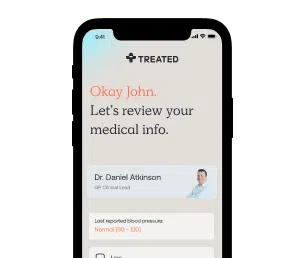Hyperpigmentation
Skin treatments to lighten your dark spots.
Secure delivery
UK clinicians
Hyperpigmentation causes patches of skin to become uneven and darker than your natural tone. Although it’s a common condition that’s often harmless, you might want to get it treated.
Answer a few questions about your health, and we’ll show you skincare options tailored to you. Order hyperpigmentation treatment online and get expert advice when you need it.
Hyperpigmentation is a term used to describe skin that has become darker and more uneven than before. It’s usually harmless, and the symptoms tend to involve changes to patches of your skin tone (pigment). The size of these affected areas can vary (they can be very small or cover large parts of your body) And they’re usually painless, but it could be the result of another health condition that needs addressing.
There are different types of hyperpigmentation. Some of the most common types are:
Hyperpigmentation can affect anyone. Because there are lots of causes and factors involved in changes to your skin pigmentation, a clinician can advise you about possible causes and treatment options.
The location of patches of darkened skin on your body can often indicate the cause behind them. Preexisting health conditions can sometimes lead to changes to your skin, as can medications you take regularly. Providing as much information as possible during your startup consultation can help narrow down the reasons your symptoms have developed.
It’s hard to say exactly how common hyperpigmentation is. There are lots of factors involved in developing changes to your skin pigmentation, including overexposure to UV rays, hormonal changes and medications that can cause symptoms.
There are a wide variety of skin tones around the world. Some studies have shown people with certain skin tones are more susceptible to developing pigmentation disorders than others, but hyperpigmentation can occur on any skin type.

How we source info.
When we present you with stats, data, opinion or a consensus, we’ll tell you where this came from. And we’ll only present data as clinically reliable if it’s come from a reputable source, such as a state or government-funded health body, a peer-reviewed medical journal, or a recognised analytics or data body. Read more in our editorial policy.
There can be several causes of hyperpigmentation. One is excess melanin, a substance naturally produced by your body to give skin its pigmentation (colour). Pigment cells called melanocytes, located at the base of the epidermis (outer layer of skin), produce melanin. Dark-skinned people make more melanin than those with lighter skin, which explains why pigmentation disorders can affect people of colour more frequently.
Hormonal changes, such as those that occur in pregnant women, can also cause hyperpigmentation. Medications, such as drugs used during chemotherapy, skin and endocrine diseases (such as Addison’s disease) can also produce darkened, even spots to appear on different parts of your body.
Overexposure to UV rays from the sun, due to prolonged periods of time in it without the right protection, can also contribute to increased melanin production.
The main symptoms of hyperpigmentation are:
Patches can develop anywhere on the body, depending on the type of hyperpigmentation that’s affecting you. It can be generalised, and affect larger areas, or be more localised, appearing only on specific areas like your face, hands or stomach.
Hyperpigmentation isn’t normally a risk to your health. Though you might want to treat it if you feel like it is impacting your appearance or making you self-conscious.
Areas of skin with uneven pigmentation won’t necessarily lead to other conditions developing, but it’s advisable that you stay well informed about potential risks surrounding skincare.
Sun exposure is responsible for lots of cases of hyperpigmentation, as UV rays activate melanin production. Melanin can absorb these rays and has antioxidant properties and the ability to protect you from potentially dangerous free radicals. Too much exposure to the sun, however, has been linked to cancer. Excessive UV radiation can damage the DNA in your skin cells, and make them grow out of control. This, along with sunburn, can cause cancer to develop. Before spending long amounts of time in the sun, it’s best to get fully informed of potential risks and take all the proper steps to stay protected.

How we source info.
When we present you with stats, data, opinion or a consensus, we’ll tell you where this came from. And we’ll only present data as clinically reliable if it’s come from a reputable source, such as a state or government-funded health body, a peer-reviewed medical journal, or a recognised analytics or data body. Read more in our editorial policy.
There are several options available when it comes to managing hyperpigmentation, and there might be some trial-and-error before you find a medication that works best for you.
Creams that contain acids are often prescribed off-label to lighten darkened spots and patches of skin. These include:
Using medications to treat hyperpigmentation can often be a process that involves time and patience before you start to notice changes. We recommend getting expert advice from a clinician before buying over-the-counter products to manage your skin condition long-term.
There are lots of cosmetic creams available over the counter that contain ingredients designed to improve pigmentation-related skin conditions. They are sometimes sold as serums, toners and moisturisers. Often, they contain ingredients such as vitamin C, alpha-hydroxy acid (AHA) and niacinamide. Some treatments, like prescription-only off-label treatments for hyperpigmentation, contain azelaic acid.
While over the counter products might offer some benefits to your skin, there is no guarantee they will work in the same way as prescribed medications. By using prescription-only treatment, you know the medications have been approved by a licensed healthcare professional. Speaking to a clinician also means you can get more specific help, by answering questions and providing more detail about your condition.
Managing hyperpigmentation often comes down to how you’re personally affected by it. Because it won’t make you seriously ill or cause pain, the decision to get treatment to improve your skin is often an aesthetic one. So while skipping treatment for it won’t result in the darkened spots or patches getting worse, you might feel the need to improve your hyperpigmentation so you’re happier with your appearance.
We’ll always give you the best advice we can about options that are suitable for you, and what to expect from them.

How we source info.
When we present you with stats, data, opinion or a consensus, we’ll tell you where this came from. And we’ll only present data as clinically reliable if it’s come from a reputable source, such as a state or government-funded health body, a peer-reviewed medical journal, or a recognised analytics or data body. Read more in our editorial policy.
Have something specific you want to know? Search our info below, or ask our experts a question if you can’t find what you’re looking for.
Markiewicz, Ewa, et al. “Post-Inflammatory Hyperpigmentation in Dark Skin: Molecular Mechanism and Skincare Implications.” Clinical, Cosmetic and Investigational Dermatology, vol. 15, 25 Nov. 2022, pp. 2555–256.
Nayak, ChitraShivanand, et al. “Skin Hyperpigmentation in Indian Population: Insights and Best Practice.” Indian Journal of Dermatology, vol. 61, no. 5, 2016, p. 487.
Oakley, Amanda. “Pigmentation Disorders | DermNet NZ.” Dermnetnz.org, 2009.
Brenner, Michaela, and Vincent J. Hearing. “The Protective Role of Melanin against UV Damage in Human Skin†.” Photochemistry and Photobiology, vol. 84, no. 3, 16 Nov. 2007, pp. 539–549.
Cancer Research UK. “How Does the Sun and UV Cause Cancer?” Cancer Research UK, 25 Apr. 2019.
Lowe, Nicholas J., et al. “Azelaic Acid 20% Cream in the Treatment of Facial Hyperpigmentation in Darker-Skinned Patients.” Clinical Therapeutics, vol. 20, no. 5, Sept. 1998, pp. 945–959.

Off-label topical cream or capsule for lightening skin pigmentation. Contains a retinoid.

A 3-in-1 treatment that softens, exfoliates and moisturises your skin.

Off-label topical cream. Can improve skin pigmentation in 6 months.
Prescription-strength topical treatment for dark skin areas. Can be used on the face.

Registered with GMC (No. 4624794)
Meet Daniel
Registered with GPhC (No. 2202465)
Meet Sanjeda
Registered with GPhC (No. 2070724)
Meet Craig
Always read the leaflet that comes with your medication and tell us about any side effects you get.
We know health, but you know you.
Our experts tell you what’s safe, but you decide what’s best.
Answer a few questions and tell us about yourself. Get tailored advice from our clinicians so you can choose better.

Choose your treatment and how often you have it delivered.

We know things change. It’s the nature of life. We’ll check in regularly to make sure your treatment is still right for you.
Pause. Change. Skip. Start again. Any time you like.
Here are some other things we can help with.
Choose from our range of tablets and solutions. Get ongoing care and support from our experts.
Stop smoking treatments that can help you kick the habit forever, and reduce your risk of disease.
Tablets or injections. Tailored weight loss treatments combined with ongoing support from our experts.
We're making healthcare more about you. Sign up to our newsletter for personalised health articles that make a difference.
Disclaimer: The information provided on this page is not a substitute for professional medical advice, diagnosis, or treatment. If you have any questions or concerns about your health, please talk to a doctor.
We couldn't find what you're looking for.
Here's everything we treat. Or, if you're looking for something we don't have yet, you can suggest something.
If there’s a particular treatment or condition you’re looking for, tell us and we’ll look into it for you.
Submit your question here, or tell us if you’ve found an issue on our site.
We’ll get back to you very soon. We aim to respond to all queries in one working day.
You’re signed up to our newsletter. Keep an eye on your inbox for our latest update.
By clicking 'Subscribe now' you're agreeing to our Privacy Policy.
We’ve sent you an email asking you to confirm your email address.